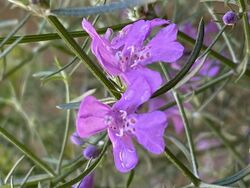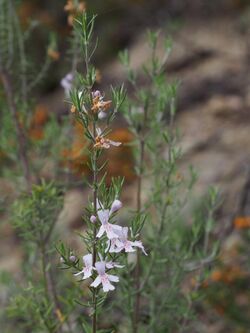Biology:Westringia eremicola
| Slender westringia | |
|---|---|

| |
| Scientific classification | |
| Kingdom: | Plantae |
| Clade: | Tracheophytes |
| Clade: | Angiosperms |
| Clade: | Eudicots |
| Clade: | Asterids |
| Order: | Lamiales |
| Family: | Lamiaceae |
| Genus: | Westringia |
| Species: | W. eremicola
|
| Binomial name | |
| Westringia eremicola A.Cunn. ex Benth.[1]
| |
Westringia eremicola, commonly known as slender westringia or slender western rosemary,[2] is a flowering plant in the family Lamiaceae and is endemic to eastern Australia. It is a small shrub, with narrow leaves and pink, mauve to white flowers.
Description
Westringia eremicola is a slender shrub growing to 1.5 m (4 ft 11 in) high. The leaves are on a petiole 0.5–0.7 mm (0.020–0.028 in) long, usually in whorls of three, narrow-elliptic to linear, mostly 8–20 mm (0.31–0.79 in) long, 0.8–1.6 mm (0.031–0.063 in) wide, margins smooth, curved under, and both surfaces with more or less flattened, simple, upright hairs. The flowers are borne in leaf axils usually at the end of branches, they may be mauve, purple or occasionally white, corolla 6.5 mm (0.26 in) long, petals triangular, 1–3 mm (0.039–0.118 in) long, 1–2 mm (0.039–0.079 in) wide, and the lower petal has orange to brown spots. Flowering may occur anytime throughout the year and the fruit is a mericarp 1.3–1.5 mm (0.051–0.059 in) long.[2][3][4]
Taxonomy and naming
Westringia eremicola was first formally described in 1834 based on plant material collected by Allan Cunningham and the description was published in Labiatarum Genera et Species.[5][6] The specific epithet (eremicola) means "lonely".[7]
Distribution and habitat
Slender westringia grows in mallee on sandy soils in Queensland, South Australia, Victoria and New South Wales.[2] Associated species include Calytrix tetragona, as well as Acacia, Daviesia, Leptospermum, Leucopogon and Triodia species.[3]
References
- ↑ "Westringia eremicola". Australian Plant Census. https://biodiversity.org.au/nsl/services/apc-format/display/109922.
- ↑ 2.0 2.1 2.2 "Westringia eremicola A.Cunn. ex Benth.". PlantNET - New South Wales Flora Online. Royal Botanic Gardens & Domain Trust, Sydney Australia. http://plantnet.rbgsyd.nsw.gov.au/cgi-bin/NSWfl.pl?page=nswfl&lvl=sp&name=Westringia~eremicola.
- ↑ 3.0 3.1 "Westringia eremicola". Electronic Flora of South Australia Fact Sheet. State Herbarium of South Australia. http://www.flora.sa.gov.au/cgi-bin/speciesfacts_display.cgi?genus=Westringia&species=eremicola.
- ↑ Fairley, Alan; Moore, Philip (1989). Native Plants of the Sydney District. Sydney: Kangaroo Press. p. 296. ISBN 0864172613.
- ↑ "Westringia eremicola". Australian Plant Name Index (APNI), IBIS database. Centre for Plant Biodiversity Research, Australian Government, Canberra. http://www.anbg.gov.au/cgi-bin/apni?TAXON_NAME=Westringia+eremicola.
- ↑ Cunningham, Alan (1834). Labiatarum Genera et Species. p. 459. https://babel.hathitrust.org/cgi/pt?id=uva.x001719124&view=1up&seq=535.
- ↑ Sharr, Francis Aubi; George, Alex (2019). Western Australian Plant Names and Their Meanings (3rd ed.). Kardinya, WA: Four Gables Press. p. 192. ISBN 9780958034180.
Wikidata ☰ Q15380330 entry
 |


